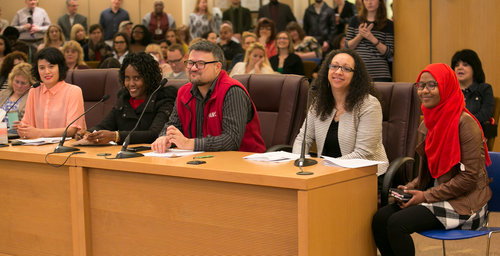Multnomah County’s Community Powered Change
April 2018
By Rachael Banks, Public Health Director, Multnomah County Health Department
To recognize National Minority Health Month, Multnomah County’s Public Health Director shares the processes that have informed their work to address health disparities and get closer to achieving health equity.
COMMUNITY HEALTH IMPROVEMENT PLANNING

After years of unacceptable disparities data, we knew we had to do something different. In the summer of 2015, Multnomah County Health Department (MCHD), set out to create a community health improvement plan (CHIP) centered on things that are largely outside of the control of the individual. In response, MCHD released a request for proposals (RFP) for the coordination of a CHIP that was created in partnership with communities of color. Oregon Health Equity Alliance (OHEA) was selected as the contractor to lead the development and implementation process for the CHIP.
Throughout 2016 OHEA, with the support of MCHD’s Health Equity Initiative (HEI), intensive community engagement and outreach (forums and interviews) were conducted to gather input from a variety of communities including: African-American, Asian, Immigrant/Refugee, Latino, Native American, Pacific Islanders, and youth and elders of color. The outreach and engagement was followed by a tremendous amount of planning, analyzing and prioritizing areas over the next year. Through these engagement efforts, a framework was developed outlining 23 goals and over 150 strategies.
In the Fall of 2017, we sought to move beyond feasibility into innovative action and cross-system thinking to identify where alignment and opportunities existed, as well as to collaborate and amplify our all-too-often siloed health equity work. Based on the input received from the engagement and outreach, we convened three Opportunity Teams that each focused on advancing different areas of community health. These were charged with reviewing the community input to prioritize strategies, policies, and other “vehicles” for moving the CHIP forward. We are most of proud of the way we were able to collectively support and activate community voice, lived experience, and wisdom to lead the process and approve the final strategies.
The CHIP reminds us our health is affected by many aspects beyond our individual control. Affordable housing, food, transportation, and jobs are all critical components to overall health. Access to healthcare, institutionalized racism, and the oppression of cultural and indigenous ways of healing also affect our wellbeing. Implementing the CHIP means taking action to change or dismantle systems and structures to better serve our community and move towards equitable outcomes.
Multnomah County’s CHIP outlines five priority areas:
1) Transformative Change Toward Equity and Empowerment – addressing systemic discrimination and disparities
2) Access to Culturally and Linguistically Responsive Healthcare – focusing on the health system
3) A Neighborhood Home for All – including issues of affordable housing and houselessness
4) Essential Community Resources – Jobs, Transportation, Food, and Education – elevating linked systems and issues related to food, education, transportation, and jobs
5) Supporting Family Ways – acknowledging traditional and cultural ways of healing through community
COMMUNITY POWERED CHANGE: BUILDING A SHARED HEALTH EQUITY NARRATIVE

Community Powered Change (CPChange) is the transformative community-driven implementation partner for the Multnomah County CHIP and is supported through a partnership between Multnomah County and OHEA. It is a collaboration of people who live or work in our county to build a healthier future by leveraging the expertise of communities, particularly those of color, to help shape future practices and policies among Multnomah County institutions and organizations.
The CPChange implementation plan consists of two approaches that supports this: 1) integrating health equity into the existing work of individual organizational partners and 2) robust, collaboration of partners across multiple sectors working together toward shared project goals. Our CPChange partners have already begun their individual crosswalks to identify where they can best align and enhance the collective work, and identify their own opportunities for investing in their organizational strategies.
COMMUNITY POWERED CHANGE LAUNCH
Community Powered Change was formally launched this year during National Public Health Week (April 2nd-8th, 2018). On April 5th, the Multnomah County Board of Commissioners made a proclamation detailing our CHIP history and process.
Moving forward, we will be supporting events to elevate our campaign among partners, funders, and other sectors to move our collective work forward. We will continue to seek transformation by both spotlighting the knowledge and experience of communities of color and integrating community wisdom throughout implementation. Transformation moves our work beyond a CHIP. Community Powered Change is our campaign to raise awareness of and implement the strategies that will go far in building a county where everyone clearly realizes their role in improving the health of our communities.